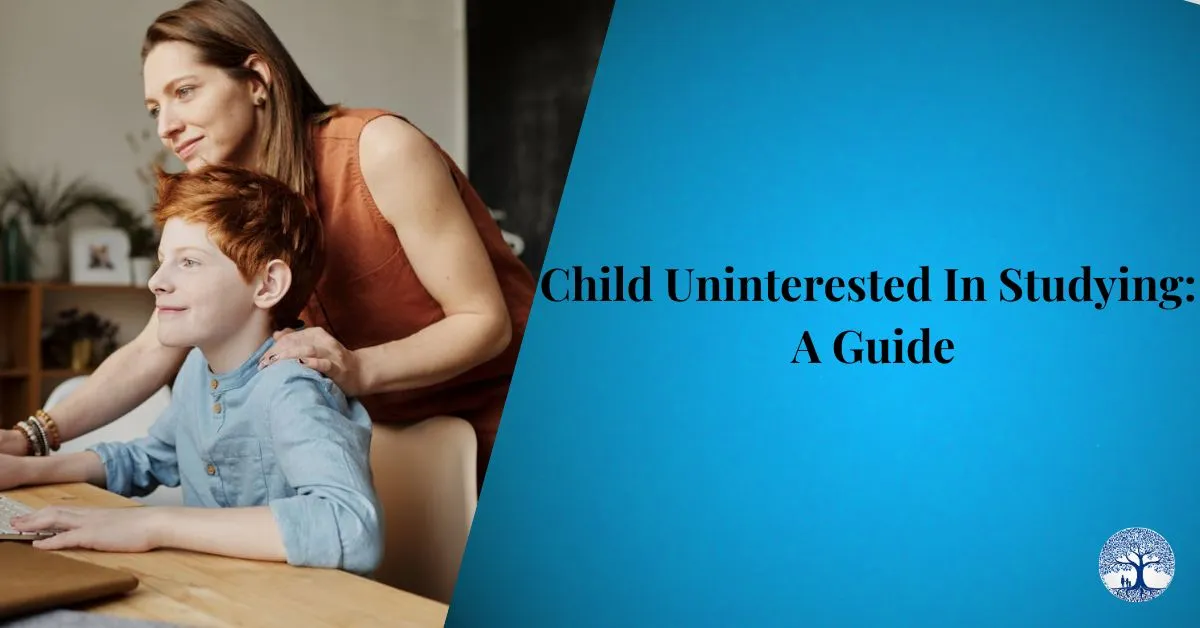Introduction
Many parents face the all-too-common concern of their child’s disinterest in studying, which can be both frustrating and worrying. This post aims to offer practical insights and strategies to help you reignite your child’s enthusiasm for learning, making study time less of a struggle and more of an engaging experience. Keeping your child interested in their studies is not just about academic success; it’s also about fostering a love for learning that will benefit their personal development and future opportunities. By understanding the root causes of their disinterest and employing effective techniques, you can help your child thrive both in school and in life.
Understanding the Root Causes
A crucial first step in addressing your child’s lack of interest in studying is to understand the root causes behind it. Here are some common reasons why children might lose interest in their studies:
- Lack of Engagement or Interest in the Subject: Often, a child may find certain subjects boring or irrelevant, which can lead to a lack of motivation.
- Overwhelming Workload or Pressure: A heavy workload or high expectations can cause stress and burnout, making studying feel like an insurmountable task.
- Learning Difficulties or Undiagnosed Learning Disabilities: Undiagnosed conditions such as dyslexia or ADHD can hinder a child’s ability to focus and learn effectively, leading to frustration and disinterest.
- Distractions from Technology and Social Media: In today’s digital age, constant distractions from smartphones, tablets, and social media can significantly impact a child’s ability to concentrate on their studies.
- Emotional or Mental Health Issues: Issues such as anxiety, depression, or low self-esteem can severely affect a child’s motivation and ability to engage with their schoolwork.
Importance of Identifying Causes:
Understanding the specific reasons behind your child’s disinterest is vital in tailoring effective solutions. By identifying the root causes, whether they be emotional, cognitive, or environmental, you can develop targeted strategies to address them. For instance, if the issue is a lack of engagement, finding creative ways to make the subject matter more interesting can help. If the problem lies in learning difficulties, seeking professional assessments and support can make a significant difference. Recognizing and addressing these underlying issues will not only improve their academic performance but also enhance their overall well-being.

Effective Communication Strategies
Effective communication with your child is essential in addressing their disinterest in studying. Here are some key strategies to foster a supportive and understanding dialogue:
Open Dialogue
- Initiating Conversations Without Judgment: Start discussions in a non-confrontational manner. Use open-ended questions like, “Can you tell me how you feel about your schoolwork?” This approach encourages your child to express their feelings without fear of criticism.
- Active Listening Techniques: Show that you are fully engaged by maintaining eye contact, nodding, and paraphrasing their statements. For example, “It sounds like you’re feeling overwhelmed by your math homework. Let’s talk about how we can make it more manageable.”
Empathy and Support
- Importance of Showing Empathy: Demonstrating empathy helps your child feel understood and valued. It’s crucial to acknowledge their feelings and experiences genuinely.
- Supportive Statements and Actions: Use phrases like, “I understand this is tough for you, but I’m here to help,” or “Let’s work on this together.” Actions such as sitting with them during homework or offering help with difficult tasks can provide significant moral support.
Setting Realistic Expectations
- Discussing Academic Goals: Engage in a collaborative discussion to set achievable academic targets. Ask your child about their goals and help them break these down into manageable steps.
- Importance of Celebrating Small Victories: Recognize and celebrate their achievements, no matter how small. Praise such as, “You did a great job on that assignment!” or rewarding them with a small treat can boost their confidence and motivation.
These communication strategies not only help in understanding your child’s academic struggles but also build a stronger, more supportive relationship. By fostering an environment of open dialogue, empathy, and realistic expectations, you can help your child navigate their educational journey with more confidence and enthusiasm.

Creating a Positive Learning Environment
A positive and conducive learning environment plays a critical role in maintaining your child’s interest in studying. Here are some key elements to consider:
Designated Study Space
- Quiet and Organized Study Area: A specific area dedicated to studying helps your child focus better. A quiet, clutter-free space minimizes distractions and signals to your child that it’s time to concentrate on their work.
- Creating an Inspiring and Distraction-Free Space: Ensure the study area is well-lit and comfortable. Personalize the space with motivational quotes, a comfortable chair, and necessary supplies within reach. Keep electronic devices out of sight unless needed for studying to prevent distractions.
Consistent Routine
- Benefits of Having a Regular Study Schedule: Establishing a regular study routine helps create a sense of stability and predictability, making it easier for your child to develop good study habits. A consistent schedule reduces procrastination and ensures that studying becomes a part of their daily routine.
- Implementing and Maintaining a Routine: Collaborate with your child to create a realistic study schedule that includes time for homework, revision, and breaks. Use tools like calendars or planners to help them track their progress. Be flexible and adjust the schedule as needed to accommodate their activities and energy levels.
Incorporating Breaks
- Importance of Breaks to Avoid Burnout: Regular breaks are essential to maintain your child’s focus and prevent burnout. Short breaks help refresh their mind and improve overall productivity.
- Ideas for Short, Refreshing Breaks: Encourage activities such as a quick walk, stretching exercises, or a short game. These activities can help your child relax and recharge, making it easier for them to return to their studies with renewed energy and focus.
Creating a positive learning environment tailored to your child’s needs can significantly enhance their study experience. By ensuring a dedicated, organized space, establishing a consistent routine, and incorporating refreshing breaks, you help create an atmosphere conducive to effective learning and sustained interest in their studies.
Engaging and Motivating Techniques
To rekindle your child’s interest in studying, it’s crucial to employ engaging and motivating techniques that make learning enjoyable and relevant. Here are some effective strategies:
Interactive Learning Methods
- Using Educational Games and Apps: Leverage technology by incorporating educational games and apps that make learning fun. These tools often use interactive elements and rewards to keep children engaged. Apps like Khan Academy, Duolingo, and educational games can turn study time into an enjoyable experience.
- Hands-On Activities and Experiments: Hands-on learning can make abstract concepts tangible and interesting. Encourage your child to participate in science experiments, art projects, or building models related to their subjects. This approach not only enhances understanding but also makes learning an active and engaging process.
Connecting Studies to Interests
- Relating School Subjects to the Child’s Hobbies and Passions: Find ways to connect academic subjects to your child’s existing interests. For instance, if they love sports, use sports statistics to explain mathematical concepts. If they are interested in cooking, relate it to chemistry and measurements.
- Real-World Applications of Academic Topics: Show your child how their studies apply in real life. Discuss how history shapes current events, how science explains everyday phenomena, or how math is used in budgeting and planning. Making these connections can help them see the relevance and importance of their studies.
Reward Systems
- Setting Up a Reward System for Achieving Study Goals: Establish a reward system to motivate your child to reach their academic goals. Set clear, achievable targets and offer rewards for meeting them. This can help create a positive association with studying and encourage consistent effort.
- Ideas for Non-Material Rewards: While material rewards can be effective, non-material rewards often have lasting value. Consider offering extra playtime, a choice of family activity, or a special privilege. Praise and recognition for their hard work also go a long way in building their confidence and motivation.
By integrating these engaging and motivating techniques into your child’s study routine, you can transform their learning experience. Interactive methods, connecting studies to personal interests, and a well-structured reward system can significantly enhance their enthusiasm and commitment to their studies, fostering a lifelong love for learning.
Seeking Professional Help
Sometimes, despite your best efforts, your child might need additional support to overcome their academic challenges. Seeking professional help can provide the necessary assistance to help your child succeed.

When to Consider Tutoring
- Signs that a Tutor Might Be Beneficial: If your child constantly struggles with certain subjects, shows a significant decline in grades, or seems overwhelmed and frustrated by their schoolwork, it might be time to consider a tutor. Other signs include difficulty staying focused, needing extra help beyond what you can provide, and persistent gaps in understanding.
- How to Find a Qualified Tutor: Look for a tutor who specializes in the subjects where your child needs help. You can seek recommendations from teachers, school counselors, or other parents. Online platforms and local tutoring centers also offer a variety of qualified tutors. Ensure the tutor has good credentials, positive reviews, and a teaching style that matches your child’s learning preferences.
Educational and Psychological Assessments
- Assessing for Learning Disabilities or Mental Health Issues: Undiagnosed learning disabilities or mental health issues can significantly impact your child’s academic performance and interest in studying. Conditions like dyslexia, ADHD, anxiety, or depression may require specialized support and interventions.
- Steps to Seek Professional Assessments: Start by discussing your concerns with your child’s teacher or school counselor. They can provide initial observations and recommend further evaluation. Consult with your pediatrician or a psychologist who specializes in educational assessments. These professionals can conduct comprehensive evaluations to identify any underlying issues and recommend appropriate interventions or accommodations.
Recognizing when your child needs professional help and taking the necessary steps can make a significant difference in their academic journey. Tutoring and professional assessments can provide targeted support, helping your child overcome challenges and develop a positive attitude towards learning. By addressing these issues early, you can ensure they receive the support they need to thrive both academically and emotionally.
Conclusion
In conclusion, addressing your child’s disinterest in studying requires a multifaceted approach. We discussed the importance of understanding the root causes, from lack of engagement to emotional or mental health issues. Effective communication strategies, such as open dialogue, empathy, and setting realistic expectations, are crucial in creating a supportive environment. Establishing a positive learning environment with a designated study space, consistent routine, and regular breaks can significantly enhance their focus and productivity. Engaging and motivating techniques, including interactive learning methods, connecting studies to interests, and implementing a reward system, can make learning enjoyable and relevant. Lastly, seeking professional help, such as tutoring or educational assessments, can provide the necessary support for your child’s academic success.
It’s normal to face challenges as a parent, and it’s important to remember that patience and persistence are key. Every child is unique, and finding the right strategies that work for them can take time. By staying supportive and proactive, you can help your child develop a positive attitude towards learning and achieve their full potential.
We invite you to share your experiences and tips in the comments section below. Your insights could be valuable to other parents facing similar challenges. Don’t forget to subscribe to our blog for more parenting tips and effective communication strategies with teenagers. Together, we can support our children in their educational journey and beyond.
Check out our blog “Natural Ways To Calm A Hyper Child“, for more such content!
Frequently Asked Questions (FAQs)
1. What are the signs that my child is not interested in studying?
Signs that your child may not be interested in studying include frequent complaints about schoolwork, a noticeable decline in grades, procrastination, a lack of enthusiasm or motivation towards homework, and avoidance behaviors such as faking illness or making excuses to skip school. They might also appear disengaged or frustrated during study sessions.
2. How can I make studying more enjoyable for my child?
To make studying more enjoyable, incorporate interactive learning methods such as educational games and apps that align with your child’s interests. Create a dedicated, organized study space that is free from distractions. Relate study material to your child’s hobbies and real-world applications to make it more relevant and engaging. Additionally, establish a consistent routine and include short, refreshing breaks to keep the study sessions lively and productive.
3. When should I consider hiring a tutor for my child?
Consider hiring a tutor if your child constantly struggles with specific subjects despite your support, shows a significant drop in academic performance, or if they exhibit signs of frustration and overwhelm that affect their confidence and motivation. A tutor can provide personalized assistance and help address learning gaps more effectively.
4. How can I communicate effectively with my child about their academic challenges?
Effective communication involves initiating conversations without judgment and using open-ended questions to understand your child’s perspective. Practice active listening by giving them your full attention and showing empathy towards their struggles. Set realistic academic goals together and celebrate their achievements to build their confidence and motivation.
5. What should I do if I suspect my child has a learning disability or mental health issue?
If you suspect your child has a learning disability or mental health issue, start by discussing your concerns with their teacher or school counselor for initial observations and recommendations. Consult with a pediatrician or educational psychologist to conduct a comprehensive assessment. Identifying any underlying issues early on can lead to appropriate interventions and support, ensuring your child receives the help they need to succeed academically and emotionally.



One Comment